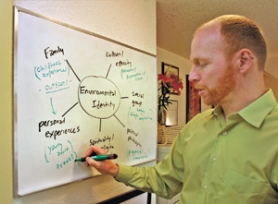Thomas’ work on sustainability was featured in the Portland Tribune as seen below.
READ/DOWNLOAD the article HERE in pdf format ![]()
Originally published online HERE at the Portland Tribune
![]()
![]()
Doctor takes in mind, body, planet
Counselor helps find sustainable paths through modern life
By LEE WILLIAMS
Pamplin Media Group, Oct 9, 2007
L.E. BASKOW / PAMPLIN MEDIA GROUP

For sustainable living, we tell ourselves,“Think globally, act locally.”
But how do we act personally?
Adopting each and every suggestion for greener living, immediately upon receiving it, is unrealistic for working adults, who have to manage jobs and families. And as in any realm of behavior, drastic changes may not be lasting ones.
Over the past decade, a new discipline, ecopsychology, has begun to bloom. The goal is to help trace individualized, realistic paths to enduring sustainable lifestyles.
“The environmental movement is the largest grass-roots movement in the world right now, and we’re not out to give people more information,” says Dr. Thomas Doherty, who is initiating what is very likely Portland’s first ecopsychological practice from his offices in the Hollywood District.
“There’s a glut of information right now,” Doherty says. “So the question is, What to do with the information? How can we sift through it all to make it personally relevant, and find sustainability on an everyday level?”
Doherty is part of a loose movement whose members, in general, believe mental health connects to the environment. This founding principle then can guide personal sustainable actions.
Counseling can take the form of counselor-led support groups, personalized life coaching, or traditional therapy with a “green-minded” counselor. Practical tools to help achieve one’s personal green goals can be as simple as introducing green spaces into everyday routines (Portland is blessed with numerous parks for such escapes) to embarking on “news fasts” — that is, curtailing the daily barrage of doomsday-themed environmental stories that emerge from the media.
News can add to stress
Some ecopsychologists embrace anti-consumerism. Doherty’s system, which he calls “Sustainable Self,” aims for a slow and mindful change. His approach has four basic planks: recognize that the environment is an issue; center yourself and accept the limits of what you can do and control; celebrate and nurture victories and accept faults; and then take action, however small, daily.
Daily battles can be overwhelming, he says, and even seem futile given the media attention devoted to massive issues such as global warming.
“I struggle all the time. An ethical life is a challenge,” Doherty says. “We’ve just had a child, and our family is back East. How do we visit our loved ones without flying? And with politics, I fall into the same bind as everyone else. I’ll open the newspaper or turn on NPR and listen to a news story, and my heart rate is up, my blood pressure is up, and I start to talk to myself,” he says. “I go back and try to practice what I preach: recognize, validate, center and accept, nurture and celebrate. … Maybe that’s in part why I came up with it, because it’s so necessary for me to do.”
Doherty grew up in Buffalo, N.Y., and completed his undergraduate studies at Columbia University in New York City. Urban settings to be sure, and he admits he was no outdoors man.
“I’d never slept in a tent until I was 21,” he says.
But he headed west, in true pioneer fashion. Doherty was a counselor for an outdoor program for teenagers called Vision Quest that traveled by wagon train. Taken with the wilderness, he became a river guide on the Grand Canyon for two seasons — time that carved out a deep impression.
“When you’re in that place, you’re immersed in so much,” he recalls, “the natural history, the native cultures, and the politics of the dams and how it links to the whole West. You start to get a sense of how things work: OK, the dam lets water in and out through the day, because of air conditioning and electrical use in Phoenix. It’s all linked together. You’re out in this pristine area but learn there’s no such thing as wilderness, really, because it’s all connected.”
Small changes can ripple
In addition to counseling, Doherty also leads Green Minds, a monthly discussion group open to anyone who wants to chat about positive environmental change over coffee. Green Minds meets every first or second Friday at World Cup Coffee (721 N.W. Ninth Ave., No. 175, in the Ecotrust building).
This fall, Doherty also began teaching Foundations of Ecopsychology at Lewis & Clark College. The course is geared toward enrollees in the college’s graduate psychology program but is open to continuing-education students as well.
For his own graduate degree, Doherty spent much of his time counseling patients in a cardiac rehabilitation unit. This was good preparation for steering bodies toward greener paths.
“I saw how hard it is for people to change behaviors,” he says. “You can’t just wag your finger and say, ‘Change,’ and the system doesn’t necessarily make it easy. But if you start with yourself, I do think it will have a ripple effect.”[/fusion_builder_column][/fusion_builder_row][/fusion_builder_container]
